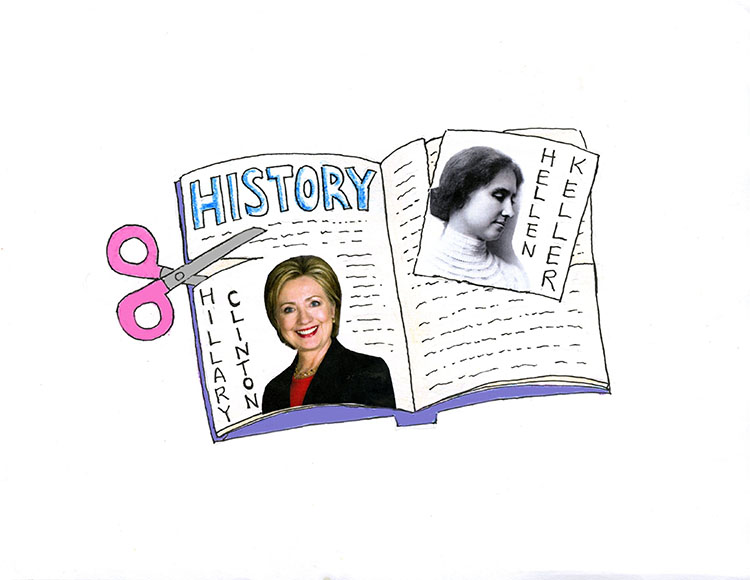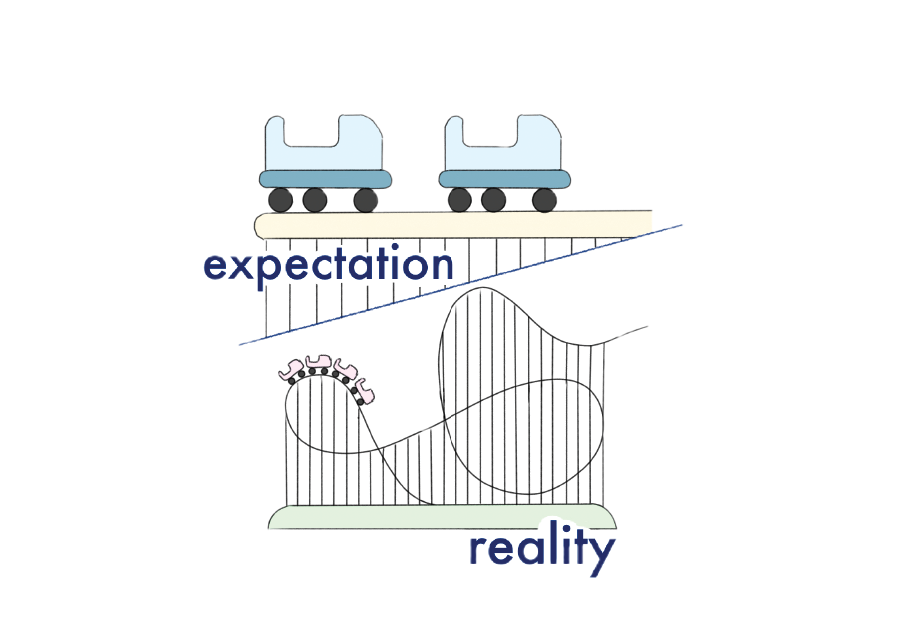//PICTURED ABOVE: Due to change in curriculum, many historical figures will be cut out of social sciences taught in public schools. Two of the heaviest-debated figures are Helen Keller and Hillary Clinton. Illustration by Kylee Hong.
Despite this, many are concerned about the biases these changes may contain. Media outlets are especially focusing on the elimination of certain historical figures from the curriculum, such as Helen Keller and Hillary Clinton.
Many of the changes have a certain political leaning in mind: conservative. Even though the changes are meant to cut down on curriculum, the board, according to Dallas News, voted to keep a description of the Battle of the Alamo as an event of “heroism”, Moses’ influence on the nation’s founding documents and several references to “Judeo-Christian” values. These changes are strongly supported by Texas Values, a “Christian values advocacy group” and several other conservative, religious organizations.
Regardless of one’s political leaning, it is a fact that the First Amendment of the Constitution say that church and state should be separate. This fundamental idea should be considered especially important in schools, institutions that the majority of children have no choice but to attend because of finances. Religion should not be forced on anyone, especially children who cannot pay to go to a private school if they or their family disagrees with the teachings of public schools.
In addition to changes that marginalize students who do not fall under the “Judeo-Christian” mold, the Texas Board of Education has further added to an environment that forces patriotism on students, such as in its description of the Battle of the Alamo and its preference for the military over other historical figures. Students around the country have been disciplined for sitting down or kneeling for the daily ritual of saying the Pledge of Allegiance in public schools. We should be moving towards education and school environments that are accessible for all students, without making anyone feel forced into an ideology they don’t agree with.
The Board nominated 15 people, including some Texan teachers, to be a part of a work group that ‘graded’ historical figures with a rubric on their historical impact and legacy. According to Dallas News, this group removed Helen Keller, a political activist, author and lecturer, from a unit about citizenship because “Helen Keller does not best represent the concept of citizenship. Military and first responders are best represented.”
However there were no comments explaining the recommendation to eliminate Hillary Clinton from the curriculum. While Clinton, the first female presidential nominee for a major U.S. political party has been eliminated, Bill Clinton’s impeachment will still be included in curriculum.
Bill Clinton’s impeachment is a clearly important historical event, but I cannot understand why this event is more important than educating students about the first female presidential nominee. However, the concept of impeachment should already (theoretically) be covered in sections about the Constitution and law concerning presidents. In my opinion, female representation in the U.S. government should be considered critical information for students. Coming from an all-girls school, it may be hard to imagine not having any positive female role models, but that is an unfortunate reality many girls face.
While the Board’s vote did have a valid purpose—the need to streamline the curriculum—its decisions are clearly biased regarding which historical figures remain and which are eliminated. If the purpose was to cut down on the amount of figures students have to memorize, then why were Hillary Clinton and Helen Keller cut out while numerous war figures and generals remain? According to Dallas News, the Board is “unlikely” to remove a “reference to the Alamo’s defenders as ‘heroic,’” despite previous recommendations to delete the biased word “heroic.”
Besides, just because students are introduced to a historical figure does not mean they have to be tested on them or memorize them. History is sometimes described as an never-ending story; how can we cut parts out of it as it grows?
This vote also raises the question of partisan politics effect on education. The problem may stem from how the government approaches public education. While many local school boards and city councils in Texas have candidates that run nonpartisan, the statewide Texas Board of Education runs partisan. However, Fort Worth Star Telegram columnist Bud Kennedy recently wrote that “both Democrats and Republicans are trying to put labels on the nonpartisan May elections,” which are the elections for local school boards and city councils.
As our political climate becomes increasingly polarized, we cannot let the divisions of American politics further infiltrate classrooms. As a state with 5.4 million public school students, Texas education is a serious topic underrepresented in national discussion.
When education is biased, it can form students’ opinions for the rest of their lives. Texas students and students everywhere should have the opportunity to form their opinions from a neutral educational background.
Story by Niamh McKinney, Arts and Life Editor
Illustration by Kylee Hong













